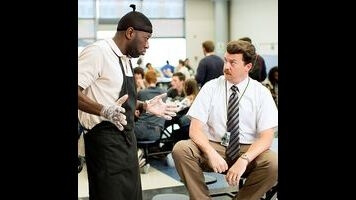With that said, there’s a single thread and theme that the show has been exploring that still makes it worth sticking with: masculinity. I asked last week whether the cruelty and generally unquestioned behavior of Gamby and Russell were hindering a true emotional investment in the show, even perhaps interfering with the potential comedy that’s built into the premise of the show. This week, the picture is a little clearer. Vice Principals seems to be purposely muddying the waters when it comes to whether or not we, as viewers, are “cheering for” Gamby and Russell, and “Circles” expands the scope of the show, diving into why Lee Russell is the man he is today.
In the opening scene of “Circles,” we see a very different Russell. When his neighbor Jackie (Owen Harn) is once again blasting heavy metal music in the middle of the night while he lifts weights in his garage, Russell is sent by his wife to confront the man and ask him to keep the noise down. Where the Russell of North Jackson High, the one trying to take down Belinda Brown, is a conniving and diabolical force, the one who confronts Jackie is much more passive. He politely asks Jackie to turn the music down, but not before saying that it’s his wife who’s asking for the favour. Then, when Jackie jokingly scares him and puts him in a headlock, Russell laughs it off, the bully-bullied dynamic clearly established.
What’s interesting about the scene is the clear contrast in forms of masculinity. There’s Russell, the well dressed and impeccably coiffed man who feels in control at his day job, a man in his element. Then there’s Jackie, the muscled, aggressive, sweaty man who leaves Russell a mess of anger, frustration, and insecurity. It’s a well-worn dynamic, but it’s enlightening within the context of this show. It gives us a peak at Lee Russell outside of North Jackson High. It gives us insight into who he is and why he acts the way he does. He’s clearly a man whose interests and perspectives don’t fall into the traditional model of masculinity, and while he may feel like the big man on campus at school, using Dr. Brown as an imagined nemesis, he’s also someone who still holds on to deeper insecurities about what it means to be a man.
It’s the pattern of the emasculated man to rejoice when he gets one over on the jock, but then cower in fear when he may be caught. That’s exactly what Russell does when he calls the cops on Jackie the following night. He sits on his living room floor, peaking through the blinds, and singing a hilarious song about calling the cops. It goes on and on, one of the show’s more inspired and outright hilarious bits so far, until Jackie looks over at the window. Russell ducks out of the way and breathes a heavy sigh of relief. This is who Russell is, and his insecurity about that, about his manhood and his role as a provider, bleed into his daily life. It’s why he can’t handle that Dr. Brown is more qualified than him.
“Circles” is all about how traditional masculinity is a constricting, ever-present, and dangerous thing. It’s not just in Russell’s confrontations with Jackie, but also in Gamby’s handling of punishment at school. Dr. Brown, after going through his records, insists that he’s being too harsh in his punishments, often giving lengthy suspensions for small crimes. So, she asks him to try a new approach, one that’s more about active listening and empathy than it is about creating strict rules of law. So, The Circle is created, where students can sit on a beanbag chair, eat popcorn, and talk about their feelings. Gamby is hesitant to embrace it at first, fearing that chaos will reign in North Jackson High, but he witnesses the positive results firsthand. He watches as two young boys realize their taunts and dick jokes are part of a deeper hurt based on betrayal and the dating of an ex-girlfriend. That forces Gamby to reckon with his own behavior, and he opens up in the Circle as well, finding comfort in the words of a few teenage girls.
So, while Vice Principals has been struggling to find its footing, “Circles” does a good job of digging into the motivations and psyche of its main characters in order to add a little depth to the comedy. The pacing still feels off—are Gamby and Russell still united against Brown? What about Gamby and his relationship with his daughter, ex-wife, and Ray?—but there’s a rhythm being established that could lead to a solid final few episodes of the season. Vice Principals is headed in the right direction, using the actions of its characters to not only inspire ludicrous comedy, but also meaningful insight into the idea of masculinity, as Gamby and Russell resort to violence before hugging it out. Maybe the Circle works.
Stray observations
- “Why would I try to touch your dick? I have my own dick.”
- Gamby has quite the motivational quote for fire drills: “Slow children burn, smart kids learn.”
- “Put your eyebrows down and calm down.”
- “I guess you’re not used to the sounds men make when they’re strengthening their bodies.”

